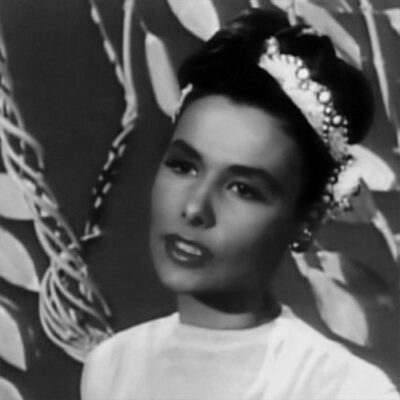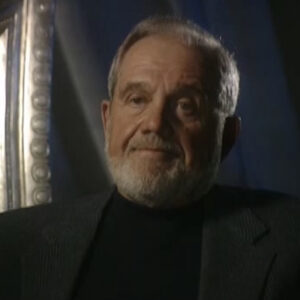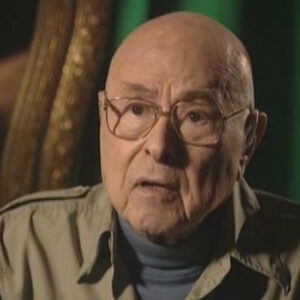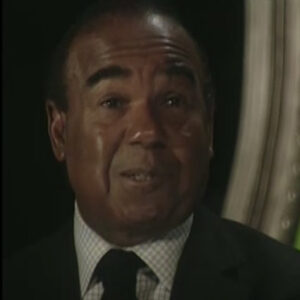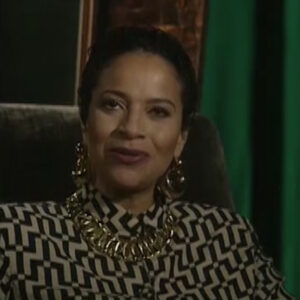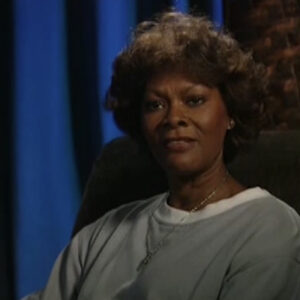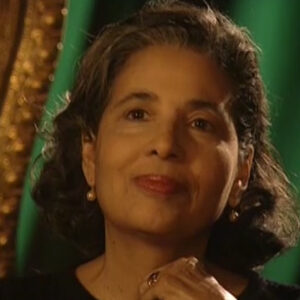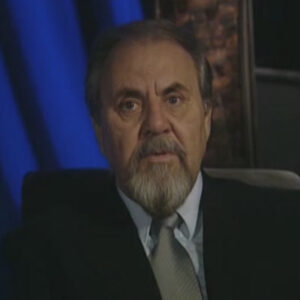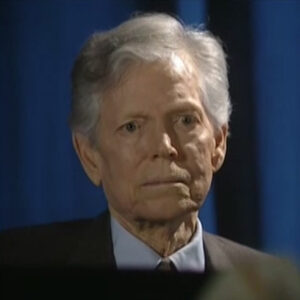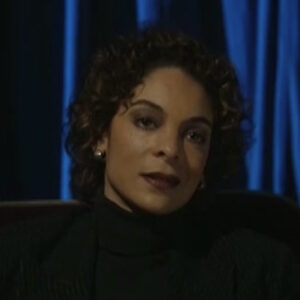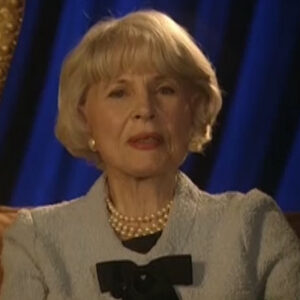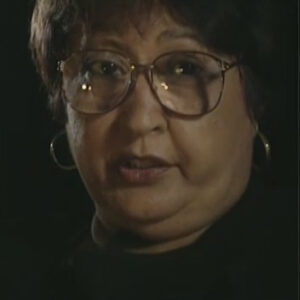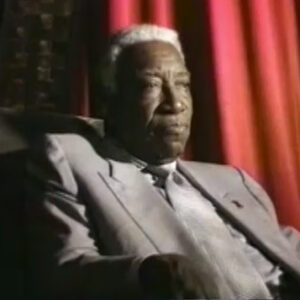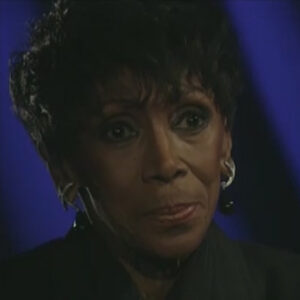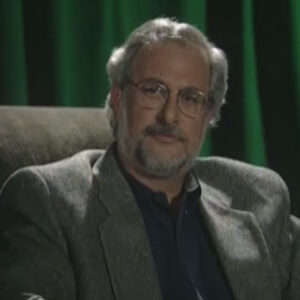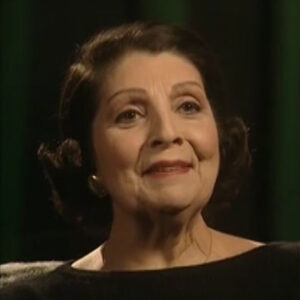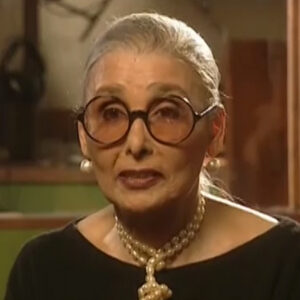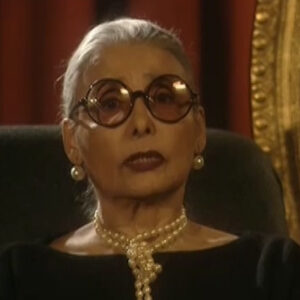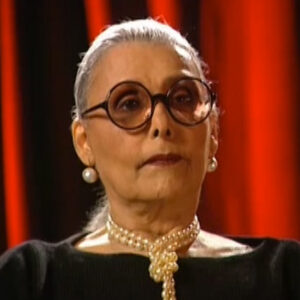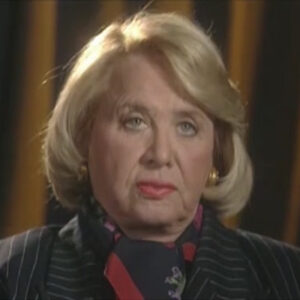Speaker My first encounter with Lena Horne, I was a kid, I lived in a small town in the Middle West that was almost entirely WASP except for me, and there wasn’t a lot to do except go to the movies.
Speaker So I went to the movies this one particular Saturday afternoon, which is my habit, and all of a sudden on the preview of coming attractions, there was this flurry of ostrich feathers and this face that peered out from these ostrich feathers. And it was Mishan in Cabin in the Sky, and it just knocked everybody for a loop.
Speaker Me in particular, yes, because. We had not ever been considered beautiful.
Speaker We had not ever been considered exciting up until that point, and when she arrived on the scene suddenly, I mean, there had been beautiful women, many of them my uncles were married to a couple that were movie star beautiful, but they weren’t considered beautiful by the general public until Lena and Lena was just so dazzling. You couldn’t avoid calling her beautiful.
Speaker What what was happening and what were black people doing in the movies, the.
Speaker No, well, I’m sure some people did relate to them, but for the black bourgeoisie, it was very hard for them to relate to Mantan Moreland, to Louise Beavers, to Rochester and people like that, even though we recognize them as people making a living and doing the best they could with what the social climate allowed them to do. But they were always in these awful servile positions, and if you’re trying to be free of that, then you’re not relating to it. And we may recognize that they were good people and nice people and certainly hard working people.
Speaker We didn’t identify with them at all.
Speaker And so we had no peers, no, no, no role models, no people to look up to. Up until this time. And then when Lena hit the scene, suddenly we not only were beautiful, but therefore there was a person that we could relate to. In Hollywood, and we had last had our movie star.
Speaker And she was the first pin up of color in Esquire. They did a she did a movie called Broadway Rhythm, in which she did a number called Brazillian Boogie, and she had I think it was a Helen Rose costume on. And she that was during the period where she was wearing her hair, parted in the middle and sort of knocked everybody for a loop because she made Hedy Lamarr fade into the background. And Esquire did a shoot of her against a kind of adobe building with a kind of intense sunlight and had her looking very sultry against this building. And it was ran in Esquire as a pinup. And this was the first black pinup that we had. She had also been the first black movie star on the cover of a movie magazine.
Speaker So she was the one that was making the breakthrough. She was paying the dues for all of those who have come after.
Speaker Just one thing, if we can backtrack for just a moment. Of she got.
Speaker OK, we’re backtrack to where?
Speaker Lina was on Broadway with. Hmm, was Brooklyn with them?
Speaker Oh, I see, OK. Yes, Lina was in a movie called Broadway Rhythm, which she did a number called Brazillian Boogie. And in this in this particular movie, she wore a costume, I think it was by Helen Rose that was very seductive.
Speaker And she had her hair parted in the middle and she sort of made Hedy Lamarr fade into the background. And she was very, very sexy. And they chose Lena to be the first pinup in Esquire magazine of color, and they posed her against an adobe building with intense sunlight and a seductive pose and just sort of knocked everybody for a loop. And, you know, you sort of felt that Lena Horne had arrived and therefore we had arrived. And you also felt that because she was also on the cover of a movie magazine that this was the beginning of our own movie star, Miss Lena Horne, you know.
Speaker What was important about Lena Horne making it big was the fact that she gave the rest of us hope.
Speaker Many of us had desires to do other things in the world to make a mark in the world. But there was very little opportunity for most of us unless we wanted to go and live in a an all black situation where we were concerned only with black like as a as a as a black doctor or a black minister or something like that. But she opened up the world for us and she suddenly made us realize that there’s something else out there and there is a possibility beyond the ghetto concept. And I’m not talking about living in a ghetto. I’m talking about a ghetto consciousness where you’re very limited.
Speaker And suddenly you began to feel that there is a possibility. And yes, she’s giving us hope. And as she made it, we applauded because it meant that maybe we, too, could make it.
Speaker You told me it was even what it was that much more personal for you because you had these dreams about the.
Speaker Yeah, well, I didn’t have a lot of abilities, I was smart, but I didn’t play ball worth a damn, I didn’t do any of the things that was I was a mediocre musician as a as an instrumental as I. I was a scholar that was kind of all over the place. So I had no focus and direction. And I started to think in terms of of the theatre as a possibility for me.
Speaker I think most people who are sort of lost in this world think of the theatre and.
Speaker When I started to talk about that and I started to say that, well, Lena is making it, maybe I can do.
Speaker My mother would say, honey, you ate Lena Horne, you know, and I said, well, yes, I know, but she said, no, there’s no yes I know about it. You are not Lena Horne, and you cannot do that.
Speaker And it but but the fact that she was there and the fact that she and I know that she went through hell.
Speaker But on the other hand, I didn’t know about all that at this at that time. And all I saw was the fact that she was getting there and that she was out in Hollywood and that she was part of the MGM family, which I wanted to be a part of desperately and all like that. So it was very, very important.
Speaker What did MGM mean?
Speaker Me, it meant fun and games, it meant a sort of a community and a family atmosphere. I got a feeling that everybody was just having so much fun in costumes and makeup and running around and then going out to parties at night and that everybody belonged to a particular family. That was very important to me because I had a very split family.
Speaker And the idea of having a cohesive group, which is something that I had never had and I never fit anywhere, was very, very appealing to me. And MGM seemed to represent that.
Speaker How do you feel her own split family?
Speaker Well, I’m not sure what you mean by split family as it pertains to her.
Speaker Are you talking about what I mean is. Father, do you know much about.
Speaker I know about that because I read the books and all, and we haven’t talked a lot about this, but I identified very strongly with that because that’s very similar to my childhood. My mother and father were separated, divorced by the time I was a year and a half old. And I come from a long history of divorces for two generations. So marriage isn’t something that I look on as anything that’s going to be very permanent or in fact, is whether it’s even desirable or not.
Speaker But that being shuttled around is very, very difficult on children. And it it it prevents a child from finding a sense of security and in that sense of security where he or she can find his own identity. And so most people who’ve gone through that grow up not knowing who they are for the longest time. And Lena has said herself that it was until she was 50 years old, that before she began to enjoy her her profession, that she. Always felt that she had to drop the glass cage.
Speaker So we start again with. The problem was that the sound? And it has always felt that you had to drop the class. Oh, OK.
Speaker She is she has always felt that she had to drop the gas glass cage to keep people from getting to her. And that’s a sign of really insecurity. And I know what she feels about that, too, because working nightclubs is the pits and you have nothing to hide behind. You have no costume, you have no character makeup, you have no proscenium. That’s you out there and all those people you feel are grabbing at you. And if you have any security insecurity about who you are, it’s murder. And I’m sure that she went through years of that hell before she finally, as she said, began to enjoy her profession and began to know who she was. She she calls herself a late bloomer, and I understand that perfectly.
Speaker Let me go back to your friendship for a moment, because I know.
Speaker How was he in the picture when you told me no? Well, just tell me about Lina being in the house. Well.
Speaker Back in the last millennium, Al.
Speaker Lina was coming to the Howard Theatre in Washington, and you could tell me it was 1940.
Speaker Yeah, about 1944, in 1940.
Speaker OK, all right, about back around 1944, Lena was, you know, really kind of a big star in Hollywood at that time. And she was coming to the Howard Theatre and in Washington, D.C., where I happened to be living at the time with my mother and my new stepfather.
Speaker And there were pictures all over town.
Speaker And it was the biggest thing that was happening at the Howard Theatre had happened in many, many years. And everybody was very excited. And I remember I got up that morning, the first morning that she was going to appear and got into the Howard Theatre very early and I was number two on line. I wasn’t number one.
Speaker A girl named Hiawatha Goerens was first and we got admitted. And part of the special premium for the first hundred people was an autographed picture, which I have to this day.
Speaker It’s beat up, but I still have it and.
Speaker The way you had described it to me when we spoke on the phone was just so dramatic because you were telling me about how you got up so early in the morning to go down to this.
Speaker You want the drama first? Yeah, OK.
Speaker And you were not number two in the movies. And you remember to this day the name of the woman who was number one. Yeah, it was Hiawatha.
Speaker Yeah, I got you. I got you. OK, you have the drama. Yes. OK, starting where? Was coming along OK, all right. So this was 1944 and Lena was coming to the Howard Theatre.
Speaker She was a big star at that time and I was living in Washington. This is in Washington, D.C. I was living in Washington with my mother and new stepfather. And everyone was very excited. And I was determined that I was going to be number one online. And I got up very early and I got into the Howard Theatre and I wasn’t number one. I was number two. And I remember the name of a person who was number one to this day. Her name was Hiawatha Goerens, and I’ll never forgive her.
Speaker But we got in.
Speaker We were we were among the first 100 and the first 100 got autographed pictures and I managed to get my autographed picture. And I’ve hung on to that autographed picture to this day. I still have it. And then we you know, we went and got our selected our seats and then sat down and all like that. And Tiny Bradshaw was the orchestra.
Speaker And finally, after he did his thing with his big band business, he came out and he said, Now, ladies and gentlemen, the moment you’ve all been waiting for the glamorous MGM singing star, Miss Lena Horne and Lena walked out on that stage and you could hear the gasp in the audience. The woman was so exquisitely beautiful. I mean, that she just took your breath away. And so you just sat there with your mouth open. You couldn’t believe that there was somebody like this on this earth and. And so she did her sat and went, oh, yes, I do remember what she was wearing, she was wearing a Helen Rose dress with a bare midriff.
Speaker She was wearing sort of beige sandals, high heels and the Helen Rose dress at a coral top and a floral bottom. She calls it her movie star dress, you know, the tie with a tie down the side and her hair was parted in the middle, like in the Hedy Lamarr style.
Speaker And she had a huge topaz ring on just one exquisite piece of jewelry that just knock your socks off. I mean, the whole thing was just just incredible. And so she she came out and she knocked the people over for a loop.
Speaker And then I fortunately had the pleasure of meeting her a short time thereafter, through some people who knew her, and as a matter of fact, one of the people had worked with her at the Cotton Club who arranged for me to be presented backstage. And that time she had a nice blue satin gown and her hair was up and she gave me her sweater to hold. And I thought I’d died and gone to heaven, you know? And so they moved us around to the other side. So that would be on the right side of the stage when she came off and when we got around there, her mother and Gayle and Teddy were there. And that’s when I first met them.
Speaker And we were all kids at that time. And it was a glorious time. I must say. I was a real fan and I just I don’t think I wash for days.
Speaker Jamaica.
Speaker Now, what were you doing at.
Speaker Well.
Speaker It was interesting because I had come to New York as an actor and I soon learned that it was kind of difficult for an actor who looked like me to get a lot of roles and to work very frequently. So I started studying voice and I had done some singing when I was a student in elementary and high school, but I hadn’t been singing since my voice change. So I started taking classes and studying with a teacher and all like that. And I had started doing some singing and then we started hearing about Jamaica. And at first it was originally written for Harry Belafonte and we knew that Belafonte was coming as well. You know, Belafonte is doing it fat chance. I’m going to have maybe as a as an understudy or something, but I doubt very seriously if I would have an opportunity to work in the show.
Speaker But then the press started talking about Belafonte may not be available and they’re talking to Juan Lena Horne about doing it.
Speaker And then this particular promotion built an.
Speaker So we we started anticipating that Lena Horne was going to do this Broadway show, and they did they rewrote, they did some rewrites and all and restarted it so that it became the woman’s show.
Speaker And I started auditioning and I auditioned and auditioned and auditioned and auditioned and auditioned, and finally when the time came, I got hired and I was thrilled to death because this would be my Broadway debut.
Speaker I’d done a lot of off Broadway and I’d done some nightclub stuff, but I had not done Broadway. And to do it with Lena Horne, who I had held up as this icon and this role model, even though, you know, I know where, as my mother said, you are not Lena Horne, even though I understood that I also thought that the woman had handled her career so well. And if I could have half the career that she had had, I would have been happy for the first day.
Speaker Mm hmm. Lena Horne. Yeah.
Speaker We did it, we what was what was the response?
Speaker Well, there was there was great anticipation.
Speaker An.
Speaker There was there was an open feeling when people weren’t quite sure of what to expect, and so she came on and she was very basic and we did a table reading that first day. And we were all bowled over by the fact that she was able to read this script with a West Indian accent that we and we had not thought of, particularly as an actress, we thought of her as a singer. But when she was reading on this table reading, she was absolutely marvelous. And we were all kind of, well, you know, what is this? Isn’t this wonderful? And it was very exciting. And we were very thrilled by that first day of rehearsal and just got better after that.
Speaker Now, precisely because it was my first.
Speaker On the stage, I understand she was upset that I wouldn’t be a bit surprised if if if lines were a problem, because she used to always in the movie, she was a star plastered against a pillar or pillar or some fancy drapery or something like that, or in a number with other folks of color that could be cut out in toto.
Speaker And in nightclubs, she never spoke, I mean, she did a wonderful show without uttering a word, so words may have presented some kind of challenge to her when the time came. But on the other hand, I remember years ago in the 40s when I was still a kid, still in that little town in the Middle West. She did a I can’t remember. It was a radio drama. And it was one of those things like Lux Theater or something like that, where she played a character name, I believe the character’s name was Lorna Doone.
Speaker And it took place in South America. And she was this sort of femme fatale kind of kind of person. And naturally, they had to place in South America, God forbid it should have been in this country.
Speaker And she was the star of that particular evening and she was quite good. But other than that, she you know, I didn’t know about her doing lines, of course, in Cabin in the Sky and stormy weather. She did. But it had been a long time since she’s done. And I guess that’s what people were concerned about, why they thought she might be nervous.
Speaker I understand with Jamaica that she had a heart, a lot of trouble with her role, but it really wasn’t well with, you know, lots of fights about that.
Speaker But what was her role like in.
Speaker Well, her role was of a an island girl, I’m sorry, Lena’s role was of an island girl.
Speaker Who?
Speaker Wanted to get off of this island in the Caribbean, as so many do, and go to New York.
Speaker And she had a boyfriend on the island who was played by Ricardo Montalban, who was a fisherman, and that wasn’t good enough for her because she had delusions of plush nightclubs in New York City and all that sort of stuff and glamour and all and.
Speaker So she she.
Speaker There was a day in which they were supposed to get married and that didn’t work out, and so she renewed her interest in leaving the island and going to New York and the fisherman was trying to keep her there and that sort of thing. And then there was a big storm. And of course, after the storm, everything was kind of destroyed. And in the process of recovering from this storm, she began to discover what the real values of life were at all. And you the show clothes, obviously, with Savannah, which was her character’s name, staying on the island, and you just suspected that she and her boyfriend were going to get married and probably raise kids, you know, that sort of thing. So it was it was an orange a new kind of role and.
Speaker She Lina was past the stage of being girly, girly, and also this was an honor, you know, who was who was kind of.
Speaker Sophisticated, and I’m just wondering if you could go back and say.
Speaker It was an opportunity that was past the point of.
Speaker Yeah, OK, it was not Injinoo role, but Lina was past the point of being girly girl. She was a sophisticated woman who had been, you know, in the business for a while and that sort of thing. So she turned the role into a sophisticated tour de force. And I don’t care what anybody says, that’s what saved the show.
Speaker What did what was your opinion of the book, the story of the show?
Speaker Oh, it was it was a musical story. I mean, all musicals have a list. Well, they did until West Side Story. And then with West Side Story, we started getting a little heftier weight in musical stories. But at that time, most musicals I mean, you look at crazy for you that just closed on Broadway and you look at some of the other stuff that that was pre West Side Story. And they just had little light stories that held them together, primarily to be able to keep the music going. And that’s what Jamaica was. It was an evening of pure entertainment with a light story. And people came to see Jamaica not for the story, but and not for Ricardo, as nice as he was and as good as he was, they came to see Lena Horne. And that is why that show was a success and ran for as long as it did. She carried that show.
Speaker Huh, I was a member of the ensemble and.
Speaker That was it, I mean, I had a small two lines and as as a ship’s officer and all, but I was glad to have that because there were so many of us who were not working at the time and haven’t since you told me.
Speaker And clearly.
Speaker Major, it was it was extraordinary, I mean, not only did we have Josephine Promise and Ossie Davis and of course, Ricardo Montalban and Eric Rhoads, we had Alvin Ailey. We had Billy Wilson. We had Nat Horn. We had Charlie Moore. We had Claude Thompson. We had Pearl Reynolds. We had Pat Dunne. We had Ethel Aylor. We had Norma Donaldson. We had all these people who were in this company. And and Charlie Charlie Blackwell was our stage manager, was a Broadway legend. And, you know, we had choreography by Jack Cole. Peter Matz was in in the orchestra pit. As was George Vivia, and it was an incredible grouping of people, it’s just amazing.
Speaker Could we? Oh, go back over this grouping of people and what I need, because a lot of the.
Speaker I know who these people are. OK. You say we had that dancer. Charlie Blackwell was the first black stage manager, you know, I. OK, I start out with just an incredible stamoulis.
Speaker We had an incredible assembly of people. It is absolutely amazing and among the dancers we had Alvin Ailey, we had Claude Tomson, we had Nat Horn, after whom a theater is named on this very street. We had Charlie Moore, who had his own company. We had Billy Wilson, who was one of our great choreographers. We had Pearl Reynolds, who’s also well-known in the dance circles. We had also a number of singer actresses like Ethel Ayler and Norma Donaldson, who went on to become well known in movies and television. We had Charlie Blackwell, who was the first black production stage manager on Broadway. We had Ossie Davis, who we all know. We had Josephine premies. We had Eric Rhoads. We had Joe Adams, who everybody probably remembers for his association with with.
Speaker Ray Charles.
Speaker It was it was an incredible gathering of people and any of us who were part of that feel very, very honored, feel that we were really kind of part of history because there has not been that kind of thing since.
Speaker Place that place to make it in the context, I mean, there was the house of flowers before.
Speaker Could you just just historically think well of the you know, of course we can go historically, we can go back in terms of black musicals, we can go back to shuffle along. We can think in terms of the blackbird’s musicals, that sort of thing. But in terms of the modern musical theater, I think well, I think before.
Speaker Jamaica, there was St. Louis woman.
Speaker And then there was House of flowers and then there was Jamaica.
Speaker And since then, we’ve had you know, Sammy Davis is Mr. Wonderful and.
Speaker Very little else. I think we had bubbling brown sugar. And black and blue and Jelly’s last jam and all but of the old type of black musicales house of Flowers in Jamaica were kind of like the apex. And there was a lull between Jamaica and anything else, there was a long, long gap after Jamaica, before anything else appeared. And there were a couple of attempts, there was a show called Comina that tried to come in and it came in, but it didn’t last.
Speaker And there were a couple of other things, but in terms of successful shows, I don’t think there was much between Jamaica and bubbling brown sugar, to tell you the truth.
Speaker I was not privy to that in my role. There was some problem, there are always problems with any show on its way to Broadway. I was not privy to the machinations that may have been going on between the composers analysis and the librettist and the conductor and the stars, the producers and directors and all those people. They were very good about keeping that away from us so that we didn’t suffer because of what was going on on them. But there are always problems with the show coming in to Broadway and there are always problems of one kind or another with shows that involve black people because we are so such a range of colors and many white people don’t understand that. And they don’t realize, as Lena says, we got all types which we do have. And sometimes there are problems with makeup and costumes and things of that nature that have to be ironed out that are because you can’t go into a black show as you can to a white show.
Speaker And it really you can’t do it with a white show either if you’re smart, because there are different skin tones there and there are different hair colors and eye colors and that sort of thing.
Speaker Could you tell me? To stand up and eat what you look like.
Speaker Well, when I when I when I first auditioned, when I first was hired for Jamaica, one of the first things they did was send me to the costumer to get fitted for or measured for a costume.
Speaker And then later on you go back and get fitted. And I went back to get fitted for my costume and she had me and a mustard color costume that I would have looked like one big pile of pus on stage. And I had to say to her, I said, no, I can’t wear that. And she looked at me and she said, Oh, well, yes, I guess you’re right. This was a woman named Helene Pons. And so she changed the costume and she started looking for something else for me to wear. I said, I can wear that as far as green. And she gave that to me instead of the mustard color and gave the mustard color to somebody who had a browner hue and could wear it and on whom it would look good. The same problem arose with the little things we wore on our feet.
Speaker They assigned me one that was much too dark for me when I told them that Capezio started going through their color wheel and they finally found my color and they looked at me and said, But that’s the same color as Mr. Montalbán. And I said, So. And when we got in to Philadelphia, we opened, as you see, I have light hair and light eyes and.
Speaker Apparently, that didn’t do too well and they called or makeup rehearsal with me trying on various makeups, and finally, our director, Bobby Lewis and Michael go upstairs and take that off.
Speaker Don’t you look like you’re in blackface? And Lena said, why don’t you leave him alone?
Speaker Don’t you know we got all types and that sort of thing. But that is that is something that. Theater people have to recognize that black people come in a variety of shades and they have to be very specific, you can’t make a generalization about what they can wear or who they are, what makeup they can put on or anything of the sort, because there are differences and those differences are very, very pronounced in many instances.
Speaker OK, can I get you to give me that last section of the story? Really? What I need to hear is.
Speaker That you that you.
Speaker She said. Got to know we come in all colors in response to which don’t you know, we got all types of facts in response to.
Speaker Oh, yeah, we went after Bobby Lewis said, go, Michael, go upstairs and take that off, you look like you’re in blackface and and say, why don’t you leave him alone? Don’t you know we got all types.
Speaker That’s what I need. I need. What are you aware of what Bobby Lewis said to you and what leanness? OK, uh.
Speaker After right after the day after we open in Philadelphia because of the lights and all like that, apparently I washed out or and so David Merrick called for a makeup rehearsal and they had me going up trying on all kinds of makeups. And finally, I had tried on several. And finally, Bobby Lewis looked at me. Bobby Lewis, who was our director, looked at me and said, Michael, go upstairs and take that off. You look like you’re in blackface. And Lena said, Why don’t you leave him alone? Don’t you know we got all types?
Speaker And that’s. That’s a lesson to be learned about, about black theater.
Speaker I said you didn’t pay for.
Speaker Yeah, he didn’t want to give us an overnight card, Zerlina, OK? And what happened in response? OK.
Speaker Where do I start?
Speaker David Merritt, David Merrick was our producer, and he he was very shrewd as as a producer and matter of fact, they don’t make Broadway producers like that anymore. What he would do is that he would open a lot of shows during the course of the year and then as one began to fade, the others would support it. And so when we opened, we were supporting a couple of shows that were fading. And then I think as we began to fade, somebody else helped support us so that we can he was able to keep his shows running for a long time. But for some strange reason, I understand he did not want to give a opening night party.
Speaker And Lena said, Don’t you know that opening night is part of the fun of being on Broadway? And so she decided to give the opening night party at the Waldorf. And so we had this big gala event at the Waldorf that Lena had arranged. And it was a joyous party, a really terrific one.
Speaker Did you go to this house?
Speaker Yeah, a couple of times.
Speaker They were small gatherings of what was it like?
Speaker Well, Lena is very, very kind of a home person. She likes to cook, she likes good food. She. She’s very relaxed, she’s very at ease, and she likes to have a few friends that she likes and I was very fortunate and that I was invited one evening.
Speaker That time she was on Western Avenue and I was invited one evening to join two or three others. And we all went off in the car with her to our home. And she her her companion and friend of that time, Irene, was still with us.
Speaker And together they whipped up some stuff in the kitchen. And we sat around and we talked and listened to good music. And it was a delightful evening. I mean, it was nothing special in the sense that, you know, no one was putting on a show or anything else like that. It was just just people sitting around being home together.
Speaker Who in the cast of Lenahan? Well.
Speaker I I mean, she and Josephine and premies and Lena were were friendly and. Seem to be close to me. She used to sometimes have Alvin or Billy Wilson up to the house, she had I think that she I think since she moved it around a little bit so that there wouldn’t be any kind of one person who was getting that kind of special favored treatment so that everybody felt that they were part of this whole aggregate of people who that she was being kind of. Lena was very wonderful to all of us. And she was nice. She was kind. She was considerate. She gave presents. I remember I got ill the second year and I was in the hospital. And the very first day I was there or the second day I was there, a huge floral thing arrived from Lena and messages came to me from her during the time that I was in the hospital. So she was very considerate of the cast and all of us loved her because she she was kind to us and she kept away. What can happen in so many companies where the star gets bitchy or whatever. She never did that. So we never had that kind of back biting bitchiness backstage. And that always comes from the top.
Speaker She’s talked about having a little difficulty with the role in. Were you privy to that at all? How do you feel, Bobby Lewis?
Speaker Well, Bobby, Bobby Lewis thought that Lena was a great actress and he. Helped guide her, and I think probably as much as anything else, he tried to help make her feel secure and that was the thing she I don’t think that she was secure in the fact that she was doing a role on Broadway. And I think that that’s what his contribution was. He made her feel secure.
Speaker He supported her and he encouraged her. And sometimes that kind of thing is the thing that really turns the tide.
Speaker One of the things that you had said about, um, you had said there wasn’t a kid in that company, didn’t know a great debt of gratitude to the that she paid.
Speaker I was asking basically what the feeling in the company was.
Speaker Everyone in the Jamaica Company recognize that Lena Horne had paid the dues for all of us, that she had been out there. She was the one that got the barriers broken down. She was the one that got it permissible for us to go to the Copacabana and not only as entertainers, but as guests. It was she who broke down the barriers in Las Vegas. It was she who broke down the barriers. She was she broke down the barriers in the Waldorf. She had gone through all that period of time and she had been beating on these doors and making sure that others that came after would have an opportunity. And there was not one of us who was not aware of that. And we respected her. We knew that we were dealing with an American icon that happened to be ours as well, and that this woman, no matter. What had gone out there and Elena said, you know, being first ain’t no fun, and she’s absolutely right. It’s not it’s tough and we all recognize that. And with the night that she was on Perry Como, one night she did the Perry Como show and the curtain was held for about 20 minutes until she could get from that was like, did she get from the studio over? She was on with Gary Cooper and she was absolutely magnificent and look absolutely breathtakingly gorgeous. And everybody in that company was crowded around a television set backstage watching. And everybody was screaming and hollering and applauding and carrying on. And then we were all the moment she she departed Perry Como. And we saw that as part of the act. You know, they had her coat holding old L4 and all like that. And she left. We were also very thrilled because that was the first time on television that a white movie star of the stature of Gary Cooper had reached out his hand to help a an actress of color up onto a wagon. And he reached down and helped her up on that wagon. We said, well, here we go, because at that time, white people didn’t touch us on television and he did. He got some flack from that afterwards, too. But nevertheless, it happened. And that was that. We knew that right then and there there was a change.
Speaker Has written about how she was hoping that Jamaica.
Speaker Black actors and actresses and singers and dancers and frustration was what it was all.
Speaker Yeah, oh, yes, very well.
Speaker David Merrick wanted Lina to do Destry rides again. I think it was in the role that Marlene Dietrich had played somebody like that, and it was a musical that he was bringing in and. He couldn’t get her out of Jamaica without closing Jamaica, and, of course, that was subjected to him, I guess, too many lawsuits and that sort of thing. So it didn’t happen. She had wanted to do it. I understand.
Speaker And then she had wanted to do a subsequent show called Saratoga, which was based on the movie Saratoga Trunk. And I think she wanted to play the floor. Rabson role and when I hear it, is that she spoke to the composers and all and they said, Well, Lena, come on, you’re a star already. We’d have to write 12 new songs. So she said so write already, but they couldn’t work that out or didn’t work that out either. And she, I believe, wanted to go on to do more of the Broadway show kind of thing and get out of nightclubs because she really hated nightclubs and she was fed up with them by that time.
Speaker And but it didn’t happen.
Speaker She also hoped that the fact that we had had that outstanding group in Jamaica would mean that more and more the black dancers and singers would be working and stage shows around New York. And it didn’t happen either. I mean, we know Alvin had to finally go out and create his own and Billy Wilson had become what he became and all.
Speaker And ah, so nothing changed really, essentially. And since Jamaica.
Speaker Things went downhill, I mean, there were there were there were no more big flashy musicals like that for a long time, and I think that she was very disappointed in that because I think that she really wanted to make it to be that breakthrough for the kids and for herself as well.
Speaker Moving you to.
Speaker Picking up our kids.
Speaker Oh, yes, yeah, she was picking up her grandchildren when they were in school. I’m sorry, Lena was picking up her grandchildren when they were in school. And the story that I heard is that she went to get them at school and one of her granddaughters looked at her and said, Are you Lena Horne? And she said, I’m your grandmother and don’t you forget it. Now, shut up. Come on. Yeah. And so they call our grandma, you know, and she loves being grandma. And now that she’s great grandma, I’m sure she’s in seventh heaven.
Speaker Yeah, Lena was a consummate professional and part of being a confident, consummate professional.
Speaker When you’re on the road, moving from space, space to space, place to place, is that your music?
Speaker Be right.
Speaker And she had four musicians that she kept under contract to her, who traveled with her at all times, and they were always the core of any orchestra, whether she was at the Sands or the the ambassador or the Waldorf or in Europe or wherever, they were the core of the orchestra. And of course, at that time, her music conductor was her husband, Lennie Hayton.
Speaker And so they always had this solid musical group that always could get her music right.
Speaker And I’ve seen it happen when performers don’t have their own musicians that musicians can can can really get way out of line and throw them off. And that never happened with her because she had her own.
Speaker And I’m sure it was an expensive proposition, but that was the price of being a professional for her.
Speaker Speaking of the music and. And you are talking about.
Speaker Yeah.
Speaker The song, Ain’t It The Truth in Jamaica, was originally written for Lina to do an.
Speaker Cabin in the sky.
Speaker I think that’s a cabin in the sky, and it was originally done for that. And in it was cut out. And it was cut out because she did it in the bubble bath. And we did not take bubble baths at that time, so that particular clip ended up and that’s Entertainment three. Of her doing eight of the truth in the bubble bath. The interesting thing is that. Also ended up in Jamaica because it was by the same composers that did did cabin and end up in Jamaica and it was a big hit in Jamaica.
Speaker But as she said, I’ve been doing this number for 12 years and I love you already. So that was kind of interesting because we I’m sure we’ve all heard tales about how songs start out in one place and end in another.
Speaker Yeah, yeah.
Speaker And then this could leave out the entertainment for the. OK, and they put it in Jamaica.
Speaker All right, do you want you want the bubble bath in that that was taken out? OK.
Speaker There was a number in Jamaica called Edith the Truth, which had originally been written for Cabin in the Sky, in which Lena had done in a cabin in the sky, in a bubble bath. And at that time we did not take bubble baths. And so it was cut out of that movie.
Speaker And she did.
Speaker Oh, yeah, I hear.
Speaker Paul. It’s.
Speaker OK, OK, that they’re OK.
Speaker There was a number in Jamaica and, you know, Hell Island Yip Harburg wrote the score that had also been in Cabin in the Sky, and it was called Edith The Truth and the Truth Lina had done in Cabin in the Sky in a bubble bath. And at that time we did not take bubble baths. So that number was cut out of the movie of Cabin in the Sky. And when it came to do Jamaica, they needed a song at a certain point and ain’t it the truth fit? So they brought it back and it showed up in Jamaica. And Lena commented in the fact that she’d been doing the song for 12 years in nightclubs since it was cut on a cabin in the sky.
Speaker And so it became part now of the Jamaica album and score, et cetera.
Speaker Because I have one sentence from you, I said, I’ve been doing it for 12 years and.
Speaker OK, do her as you just did before.
Speaker And ain’t it the truth ended up in Jamaica and, you know, I’ve been doing this no saying it’s the truth for 12 years in nightclubs and here I am still doing it, you know?

